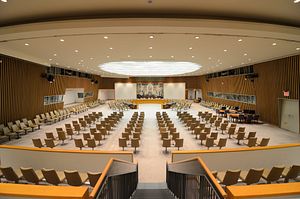Pardon me (sniff); the Naval Nonproliferation Diplomat always gets weepy at birthdays. Yesterday marked UN Security Council Resolution 1540’s tenth birthday. The council approved the measure to quell the spread of hardware and substances useful for building unconventional weaponry or delivering it against urban centers. UNSCR 1540 mostly targets nuclear, radiological, chemical, and biological munitions and ballistic missiles on which they can be fitted. I am the humble coeditor of 1540 Compass, a niche journal that explores how governments and international institutions are trying to comply with the mandate set forth in UNSCR 1540. Short answer: fitfully.
The resolution aroused controversy at the time. Why? As a rule the United Nations is a yawn-inducing place. But not in this case. UNSCR 1540 is not a friendly suggestion but rather a ukase ordering UN member countries to change domestic law. Governments must enact export-control laws and regulations, tightening control of the manufacture, sale, and transport of suspect and verboten items. The Security Council issued UNSCR 1540 not under Chapter VI but under Chapter VII of the UN Charter. Chapter VI resolutions recommend countermeasures against threats to international peace and security. Chapter VII empowers the council to make decisions on such matters that are compulsory for all UN member states.
The Security Council, then, overrode national lawmaking processes for the sake of international security. In theory, at least, it lifted nonproliferation to the top of national agendas. Such peremptory measures are bound to rankle. But have UN member states complied with the resolution? Sort of. Ten years on, the system remains a work in progress. In principle, governments must do X, Y, and Z. In practice, though, they have the latitude to define how they will execute commitments X, Y, and Z. There’s ample wiggle room within the UNSCR 1540 straitjacket, as it turns out. And maybe that’s just political reality. The United Nations can put export controls on the to-do list, but local discretion determines how to cross that item off the list.
Non- and counterproliferation are odd beasts. Mass-destruction terrorism is an international bane, but it’s countered in large part though domestic lawmaking and law enforcement. And what about the politics? Everyone understands the stakes in a hypothetical way. An atomic bomb detonated in your hometown would ruin your whole day. But such an attack has never occurred. A dozen-plus years after 9/11, consequently, officials and ordinary citizens around the world can be forgiven for ranking proliferation as just one priority among many. And those other priorities include things like law enforcement, economic development, and basic services — you know, things that touch people’s everyday lives, for better or worse.
So there are opportunity costs to UNSCR 1540, as there are to any ambitious undertaking. How do you summon up popular passion to pay these costs? How do you justify siphoning resources from concrete government functions into battling a seemingly remote, abstract hazard like atomic terrorism? Good question. When you figure out how to get people to grok the danger, drop the fine folks in New York a line. That would make a fine birthday present.

































